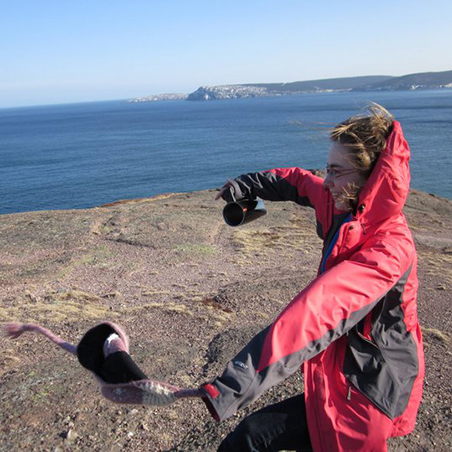Coren Pulleyblank
PhD Candidate School of Chemical Sciences, Dublin City University
Bachelor of Arts (Hons), History of Science & Technology and Classics, 2009
Imagination is hugely important to science.
It was the summer of 2015. In a mountain pass high up in the Alps between France and Italy, Coren Pulleyblank was using a small shovel to dig into the muck and mire, collecting samples. Forty centimeters down there was a layer of churned up mud, a layer that very well might hold clues that would solve a historical mystery – just where exactly did Hannibal cross the Alps with his troops and elephants to do battle with the Romans?
“What our team discovered was suggestive,” Coren says. “Highly suggestive. We can’t fully conclude it. Not yet anyway. The research is still ongoing.”
The discoveries included microbes associated with horse and (maybe) elephant dung. It is hard to imagine how they might have arrived at that spot in the Alps, at that point in time, with that much disruption, if not for Hannibal and his forces. But it may be up to other researchers to clinch the deal.
“This is some of the first work that combines so many disciplines – history, archaeology, botany, mineralogy, environmental analysis, soil chemistry – it’s novel in that way. The story also appealed to me because I had been a Classics student.“
Coren was part of a team exploring and sampling under the direction of Bill Mahaney, a professor at York University. Coren had gotten to know him when she went to York for a BSc after graduating from King’s. She wanted to work with him and travelled to the site at Mont Viso on her own dime.
“I felt that it was an opportunity worth taking,” she says. Indeed. She was with the team for its last year of field research and the publication of papers that suggested the solution to the Hannibal mystery was at hand.
“It was really fun to be in that moment with all the publicity,” she says with a big smile.
Interesting where a liberal arts degree from King’s can take you.
These days Coren is out of the media limelight but deeply ensconced in important research as she pursues her PhD through Dublin City University. She had developed a deep interest in soil and water systems in her undergrad and she continues in that field now.
It also led her to apply for a research position with a prestigious funding source attached.
“I have a Marie Curie Early Stage Researcher fellowship,” she explains, though she smiles at the name and says it’s a long way from working in Curie’s crumbling basement lab. “It’s provided by the European Union and works to develop networks for new researchers. You have to be an international student and you have to travel. The program I am on is called Remediate, and our aim is to improve decision making for the contaminated land industry.”
Remediate has taken her to Dublin, Belfast, Copenhagen, Torino, Germany, and most recently, Cranfield University in the UK. Coren is looking for ways to get microbes to solve a particular environmental problem – spills or leaks of polycyclic aromatic hydrocarbons (PAHs). They are often found near wood preservative plants and at coal processing plants. They are toxic and carcinogenic. Using microbes, bioremediation, to clean them up is a major advance in environmental science.
But convincing microbes to act in a certain way is not the easiest of tasks, and making sure they don’t create additional toxic byproducts while they’re working is tricky business. It takes solid science and a good dose of something else – imagination. Coren says she learned the crucial role imagination plays in discovery at King’s.
“Imagination is hugely important to science,” Coren says “both in terms of choosing your question but also in designing your analysis… and deciding how you’re going to present your research.”
She cheekily follows her statement with an invitation to the 2018 summer Edinburgh Fringe Festival, where’s she’s just won a spot to sing her new number, the Soil Remediation Blues.
Imagine that.
Posted: Mar. 2018
